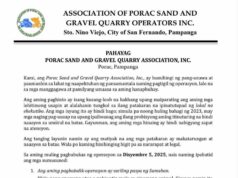So read a news report coming out of last week’s Regional Peace and Order Council 3 meeting, the first since last year’s elections.
“All of the provinces in Central Luzon are peaceful and ready for further development, a step before being declared insurgency-free.”
So pronounced 7th Infantry Division of the Philippine Army led by Major General Angelito De Leon, as quoted in the same news story.
“(R)eady for further development.” Some sense of déjà vu suddenly screaming at that phrase.
Instant replay to January 2014, at The Promenade of King’s Royale Hotel: Armed Forces of the Philippines Chief of Staff Gen. Emmanuel T. Bautista declaring Pampanga “peaceful, insurgency-free and ready for further development” in a memorandum of agreement he signed with Gov. Lilia G. Pineda.
Further, data presented by the AFP showed that of 11 Luzon provinces previously declared insurgency-free, three are from Central Luzon: Aurora, Nueva Ecija, and Tarlac. Which with Pampanga in 2014, and Bataan in the latest AFP statement, leaves but Zambales and Bulacan in the AFP’s red list as of the moment.
An insurgency-free Central Luzon “ready for further development,” indeed.
But not quite. Au contraire, as a matter of view from the other side of the ideological divide reading “ready for development” as tantamount to “inviting foreign companies and their local partners to grab land, exploit, take advantage and oppress the working class and peasantry.” They said then. Most certainly they would say again now.
“The workers and peasant masses… continue to suffer from intolerably oppressive and exploitative conditions in the big haciendas, sugar centrals…in the so-called special economic zones,” to requote stock-in-trade statements of the CPP-NPA, albeit with little abridgement. “Tens of thousands of peasant masses are being displaced as a result of widespread land grabbing by big landlords and so-called developers who are in league with the ruling regime.”
Development on one hand. Oppression, exploitation, displacement on the other. Whatever good of the former cancelled by the evils of the latter.
While the alert level has been raised by the AFP in connection with the 48th anniversary of the NPA founding on March 29 – warning of possibly lethal celebratory fireworks, an equally high alert level is required for propaganda – and counter-propaganda – rising out of the coming of the same red-letter event.
Such as these insurgency-free pronouncements?
Let me just advance this caveat: Take things like these with the proverbial pinch of salt.
Believe though in the universal given: That insurgency feeds on oppression.
An elemental revolutionary tenet: So long as poverty, inequity, injustice exist, so does insurgency. The cause is what matters most.
Here’s an excerpt from an old short essay touching on the primacy of causes over personalities in revolutionary movements.
History shows that successful movements, even revolutionary ones, are solidly grounded on causes. It is the cause that solely makes the rallying point. The personalities serve as the coordinate points.
Not even so charismatic a revolutionary as Che Guevara succeeded in fomenting the Bolivian revolution with him as the rallying point. Che failed in rousing the Bolivians not so much for their lack of faith in him as for the absence of a cause to rally them.
Everyone in Bolivia in1967 was poor. There were no oligarchs from whose stranglehold the people should be emancipated. There were no large landowners whose lands needed to be distributed to the people. Even the military government was not as repressive, as corrupt nor as unpopular as its civilian predecessor. So assessed an American political think tank at the time.
Now, think why and how the Communist Party of the Philippines-New People’s Army managed to survive through all these years, despite the government’s mailed fist approach to the insurgency, its all-out war against the “communist terrorists;” despite all those land reform programs to “emancipate” the peasants, thus dissuading them from joining the insurgents; despite the capture and subsequent “rehabilitation” of the CPP-NPA leaders, from Dante Buscayno to Rudy Salas to Romy Kintanar to Popoy Lagman; despite the extrajudicial killings of militants.
The answer: the primacy of the cause. Personalities subsume themselves to the cause. Never the other way around. The fate and fortune, especially the misfortune, of the personalities feed, nay, nurture the cause. Here, we are reminded of Che: “Wherever death may surprise us, it is most welcome. Our funeral dirge will be the staccato sound of machine guns and the cries of battle and victory.”
Of all the movements in the country today, only the insurgency can lay claim to that age old truism that “nobody is indispensable.”
Again Che: “What do the danger and sacrifices of a man or a nation matter, when the destiny of humanity is at stake.”
Yes, insurgency-free assumes a meaning radically different from that by which it is defined by the military, no matter the commander-in chief, whether a Marcos or an Aquino, or even a Duterte.




